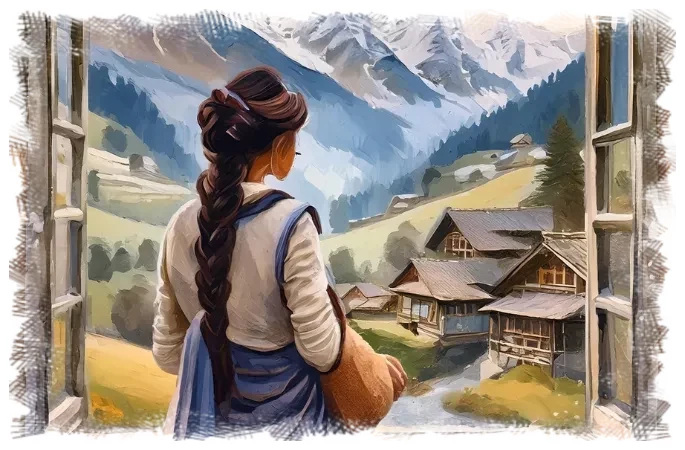If you are going to teach full-time in the school with a toddler at home, you must have someone to care for him when you are at work.
Fortunately, word gets around very quickly as soon as a new family arrives at the school campus in the International school in Mussoorie, the small mountain town in the foothills of the Himalayas, where I was to teach English for the next 16 years. Many of the utility employees have wives, sisters or relatives who are willing and happy to have jobs in Staff homes. Some have already worked in the homes of staff who had been at the school on short or even longer contracts, and had either moved on to other jobs, or returned to their home countries. Some bring references with them, and some others are vouched for by word of mouth. Having house help is common in countries like India, and soon the help becomes a member of the family. At my paternal grandmother’s house the maid was still calling me “Baby” even though I had two children of my own! At the time of joining the International school, there were students from thirty-two countries and a number of overseas staff from different countries like Canada, the US, the UK, Germany, France, New Zealand, Australia, and a few others. The school was a veritable United Nations of sorts. The domestic staff was accustomed to the eclectic mix of cultures and personal styles of those they worked for.
At the first house allocated to us a young woman arrived offering help to look after the toddler and do some light housework. She was well spoken in both English and Hindi and dressed quite fashionably in the Indian salwar kameez, a long shirt with a scarf thrown around the shoulders and loose pants. She always carried a jhola or sling bag. Although she called me Memsahib, meaning the mistress of the house, we could have easily switched roles, she cut such a fine figure. I felt I would be quite hesitant to give her instructions. She named her price and we immediately agreed to it, feeling that the toddler would be happy to be around a sweet young face. If I remember correctly, she did carry a reference letter with her. As it turned out, there was no water at that location during the day, and she found it difficult to fetch water from the rainwater tank outside the home. She saw no point in doing the job and decided to move on, mentioning the lack of water as the reason. My husband was glad when she left of her own accord on because she insisted on calling him “daddy.” The correct way to address him would have been to call him Sahib (which means master of the house). After all, she didn’t call me mummy, so I didn’t quite understand why she would call him “daddy.” She’d dust his shoulders with her hands as she took off his overcoat when he returned from work, and gently say ‘kitne thukkey hu-eh lag rahen hain aap’ (‘how tired you look’!!). Now, her hands on his shoulders were a bit too much for him!
As luck would have it, there happened to be another staff home that was vacant on the school campus. This one did not have a water problem. When we moved to that home, a middle-aged woman knocked on the door wanting to be hired. She was small in stature, wearing a simple saree, with her hair coiled in a bun at the nape of her neck. She had a sweet smile, and the toddler took to her at once. In an amazingly short span of time, she too endeared herself to the toddler. He found it hard to pronounce her name, and she his. But each knew when the other was being addressed. There were few tears from the toddler when I left for school. He tucked himself into the folds of her saree while she held him lovingly and waved me goodbye without much hesitation. He was just nine months old at the time. When I returned from work, she would take her leave and while going out the door, she would say in Hindi “Memsahib, I have done the deshting! She meant ‘dusting.’
The ayah, (as they were called then) had a daughter and two sons and the toddler later became good friends with one of the sons. When he started pre-school, he often stopped at her tiny home on the way to our house. He enjoyed eating rotis and daal (lentils) in metal thalis (plates), sitting cross-legged on the floor of the maid’s home. Since her home had no exhaust, and the cooking was done on a wood fire, he came home smelling of wood smoke. The family also kept a goat tethered in one corner of the miniscule home. So, in addition to smelling of the wood fire, the toddler smelled of goat! A heady mix! In addition he developed a strong Garhwali accent when he spoke Hindi.
No narration about the faithful helpers at our home would be complete without the dhobi or washerman. Our dhobi was a young man who was both deaf and dumb. He could only communicate with us through the use of sounds and gestures. We soon learned to interpret the meaning he was trying to convey. If my husband were home, he would often ask for an apple and express his great joy with loud sounds of joy and a huge smile, when he received one. The most wonderful thing about him was that he loved the toddler. Sometimes he would ask to take the toddler for a walk. He signaled in the direction of a place which housed a dormitory for the younger boys who studied at the school, and their supervisors. It was just a few minutes from the house and followed an uphill path. Even before he was given permission, he would lift the child in his arms and start out the door. We were naturally quite nervous but trusted him to bring the toddler home safely, which he did. The toddler had very curly hair which fell down to his shoulders, and the dhobi would stroke his hair lovingly and smile widely in his characteristic smile. He also knew all the ‘news’ on the hillside. A few months before we were to leave for Canada, he showed us that he knew by putting his right arm in the air and moving it in an upward trajectory – mimicking the flight path of a plane!!! How did he know, we wondered!!
One day I noticed that the cover for the divan in our living room, the one with the red and white flowered pattern on it, was missing. Fortunately, I had a picture with the divan spread in an album. I showed it to our dhobi. He made sounds to show that he had it with him and promptly returned it the next time he came to the house. He was indeed a very honest man.
As part of the Staff benefits package, the school hired a group of cleaners at a subsidized rate to work in staff homes. We would be billed directly each month if we wished to avail ourselves of this service. The cleaner assigned to us was a young man short in stature, always very pleasant, respectful, and a diligent worker. He wore a khaki uniform and came to the house every day except on a Sunday. He cleaned the washrooms, dusted out the carpets and broomed and mopped the floors. There were no vacuums in those days! In the summer, he hung the carpets to air out on the railing of the pushta (the retaining wall). When he brought them in, the house smelt warm and fresh. During the monsoon season, the carpets had to remain indoors, and the home had a musty smell. When he finished cleaning our home, he would move on to the next house and repeat the process.
To prepare the evening meal, we hired a part time cook. He usually arrived at about 7:30 pm and was fast and efficient. In an hour and a half, he had cooked a meal, cleaned the kitchen, and prepared parathas (Indian flatbread) for the morning breakfast which were stored in a stainless-steel box to be eaten with cheese spread as the toddler and I walked down the hill to the high school where I taught. That’s the way we ate our breakfast, since we did not want to be late. Our cook could whip up anything from Chinese cuisine to North Indian delicacies and other Indian dishes. When we left for Canada he wept like a baby. After sixteen years, it was hard for us to part from all our faithful campus helpers.
There were others who came regularly to the door to deliver essential services. The milkman in the typical dress of the mountains, loose flowing shirt, and pants with a half jacket. arrived each day with his clanking metal jug full of milk, and small pouring utensil.. He had walked for about an hour or more from the village where he lived and tied his small pony at the bottom of the hill before walking up to our home. We had to receive the milk in one of our utensils, then proceed to boil the milk for at least twenty minutes before we could use it. He had a toothy smile and was always cheerful and happy. We often teased him about how much water he mixed in the milk, as sometimes the milk seemed watery! Of course he vehemently denied the charge. For a few extra rupees, he was happy to give the toddler a pony ride on the mountain path that wound its way below the house.
When I was growing up in Bombay, the biscuitwalla (walla means person) came to our home every Saturday to sell cakes and biscuits. Every vendor in Bombay has the suffix walla attached to his name. So, for example, the milkman would have been called ‘doodhwalla.’ The baker was an older man and carried a metal trunk on his head with sign ‘Vienna Bakery.” Vienna in Bombay, well we kids thought that was pretty exciting! At the school in the mountain town an older baker carrying a tin trunk on his head brought delectable cakes and biscuits all the way from his bakery in the bazaar, the market in town. He had walked to the school gate for about forty minutes and then uphill to our home. Even a huge landslide did not deter him from braving the narrow, treacherous path from the town to the school. That too with a heavy trunk on his head. There was no way he could walk through the landslide taking his usual route. At Easter and Christmas he brought special plum cakes and mincemeat pies, which our children particularly enjoyed.
Life in the mountain town had a flavor of its own. Apart from the unique flora and fauna, the stunning view of the distant hills and mountain peaks, the Garhwali people, or the mountain folk, it was a place we called home… a place we will always remain in love with and celebrate those fond memories. Moving to another continent was painful, we brought some precious personal belongings like family photographs and treasured books but…
The only things we couldn’t bring
Were the mountains, the valley, the mists
The smell of the pines, the roar of the panther,
The paths covered in soft seductive red
As the rhododendron trees dropped their flowers
The chai shop at Jabarkhet on Tehri Road
Where a cup of tea for a small price
Included the splendor of the Himalayan mountains
A glimpse of the plains of Dehra Dun between.
(Lines from my poem “Recreating Home”)



